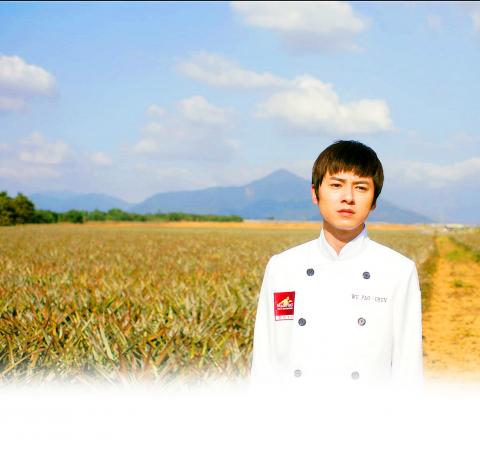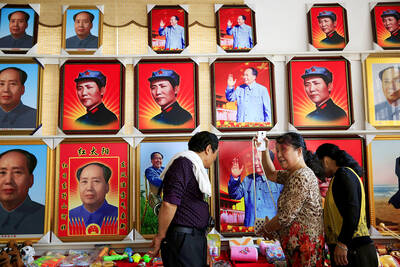Having disappeared from view after a series of critically acclaimed art-house films in the late 1990s and early 2000s, Lin Cheng-sheng (林正盛) makes a curious comeback with 27°C — Loaf Rock (世界第一麥方), a drama-filled commercial flick based on the life story of Wu Pao-chun (吳寶春), the master baker and homegrown hero who won the title of Bakery Master at the prestigious Bakery World Cup in Paris in 2010.
Adhering to dramatic conventions and supported by a well-cast troupe of adept actors, Lin’s latest cinematic endeavor turns the life of the baker into an absorbing story about a poor country boy overcoming adversity and triumphing in the end.
Up-and-coming actor Lego Lee (李國毅) plays Pao-chun, who was born and raised to a poor family in rural Pingtung. Having lost their father, Pao-chun and his siblings are brought up by their mother, played by Taiwanese singer and entertainer Wang Tsai-hua (王彩樺), who works manual jobs in pineapple plantations. To help out with the family finances, Pao-chun leaves home to apprentice at a bakery in Taipei after graduating from junior high school. While other bakers muddle along, feeling trapped in a low-end job leading nowhere, Pao-chun works diligently, believing that hard work will eventually lead to success.

Photo courtesy of O.G. Sun Productions
With support from his childhood buddy Chiu-pang (Kao Meng-chieh, 高盟傑) and rival-turned-friend Peng-kan (Huang Teng-hui, 黃鐙輝), Pao-chun soon helms the kitchen at a successful bakery. The inspiring baker, however, suffers a setback when he meets fellow pastry chef Kuang (Darren, 邱凱偉), who says his bread is “dead” rather than “alive.” Professionally challenged, Pao-chun entreats Kuang to provide him with advice, and is subsequently led to a series of culinary explorations that help to further his understanding of baking.
Meanwhile, Pao-chun runs into Hsin-mei (Summer Meng, 孟耿如), the girl he had a childhood crush on. Love quickly blooms between the two, but Hsin-mei’s mother (Belle Yu,于美人) forces the couple to break up as she regards the baker an ineligible suitor because of his humble upbringing.
Back in his hometown of Pingtung, Pao-chun’s mother passes away having suffered from Alzheimers.

Photo courtesy of O.G. Sun Productions
Heartbroken, Pao-chun persists in the path he has set for himself, having his mind set on the prestigious Bakery World Cup in Paris. And the rest, as they say, is history.
Director Lin’s first feature film in nine years, 27°C — Loaf Rock is an adept translation of a biography to a melodrama. In the 100 minute-long condensed version of Wu’s life, the protagonist overcomes limitations and surmounts obstacles, while the dramatic arc is cleverly driven by the man’s love for the two women in his life. From the young Pao-chun’s first taste of sweet red bean bun, which, in the movie, becomes synonymous with his puppy love, to the baker’s award-winning bread that is dedicated to his late mother and first love, the film stays focused in its portrait of a common hero both tormented and bettered by love and longing.
At times, the voice-over narration by the main character, while retaining a biographic tone, appears redundant and shows a dependency on telling the story through the off-screen narrator rather than using cinematic language.

Photo courtesy of O.G. Sun Productions
Fortunately, the narrative weight is sustained by Lee’s commendable performance as a sensitive young man with quiet determination. The overall tone is kept vivid by a company of colorful characters. Kao, a regular in director Chang Tso-chi’s (張作驥) films, in particular, brings a human dimension and vigor to his role as sidekick that could have easily been reduced to kitschy comic release in less-skilled hands.
The film is also embellished by a bevy of real-life filmmaking professionals, such as directors Fung Kai (馮凱), Chu Yu-ning (瞿友寧) and Ko I-chen (柯一正), as well as Taiwan’s favorite comedian Hsu Hsiao-shun (許效舜). Attentive audience members will be awarded with the fleeting appearances by Lin and real-life master baker Wu.
With a relatively poor upbringing in the countryside of Taitung and having worked as a baker for 10 years before venturing into the filmmaking business, director Lin shares many similarities in life with Wu and reportedly made the film as a gesture of encouragement to those from disadvantaged backgrounds. With 27°C — Loaf Rock, the art-house cinema director casts a melodramatic eye on the life of a common hero, and hands in a feel-good movie rooted in grassroots sentiments and emotions.

Photo courtesy of O.G. Sun Productions

Photo courtesy of O.G. Sun Productions

Taiwan can often feel woefully behind on global trends, from fashion to food, and influences can sometimes feel like the last on the metaphorical bandwagon. In the West, suddenly every burger is being smashed and honey has become “hot” and we’re all drinking orange wine. But it took a good while for a smash burger in Taipei to come across my radar. For the uninitiated, a smash burger is, well, a normal burger patty but smashed flat. Originally, I didn’t understand. Surely the best part of a burger is the thick patty with all the juiciness of the beef, the

The ultimate goal of the Chinese Communist Party (CCP) is the total and overwhelming domination of everything within the sphere of what it considers China and deems as theirs. All decision-making by the CCP must be understood through that lens. Any decision made is to entrench — or ideally expand that power. They are fiercely hostile to anything that weakens or compromises their control of “China.” By design, they will stop at nothing to ensure that there is no distinction between the CCP and the Chinese nation, people, culture, civilization, religion, economy, property, military or government — they are all subsidiary

This year’s Miss Universe in Thailand has been marred by ugly drama, with allegations of an insult to a beauty queen’s intellect, a walkout by pageant contestants and a tearful tantrum by the host. More than 120 women from across the world have gathered in Thailand, vying to be crowned Miss Universe in a contest considered one of the “big four” of global beauty pageants. But the runup has been dominated by the off-stage antics of the coiffed contestants and their Thai hosts, escalating into a feminist firestorm drawing the attention of Mexico’s president. On Tuesday, Mexican delegate Fatima Bosch staged a

Would you eat lab-grown chocolate? I requested a sample from California Cultured, a Sacramento-based company. Its chocolate, not yet commercially available, is made with techniques that have previously been used to synthesize other bioactive products like certain plant-derived pharmaceuticals for commercial sale. A few days later, it arrives. The morsel, barely bigger than a coffee bean, is supposed to be the flavor equivalent of a 70 percent to 80 percent dark chocolate. I tear open its sealed packet and a chocolatey aroma escapes — so far, so good. I pop it in my mouth. Slightly waxy and distinctly bitter, it boasts those bright,